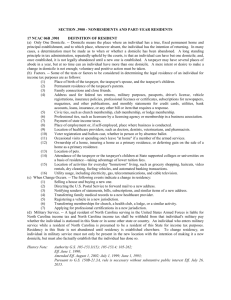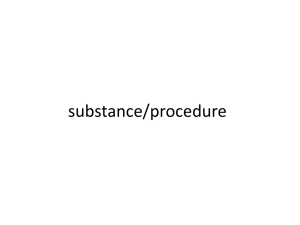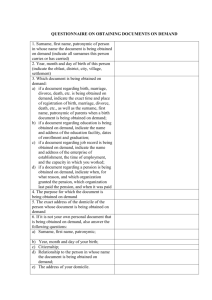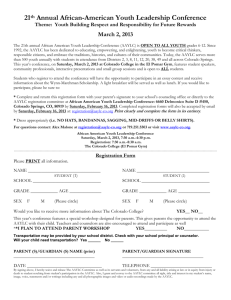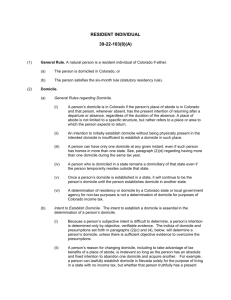income tax - Colorado Secretary of State
advertisement
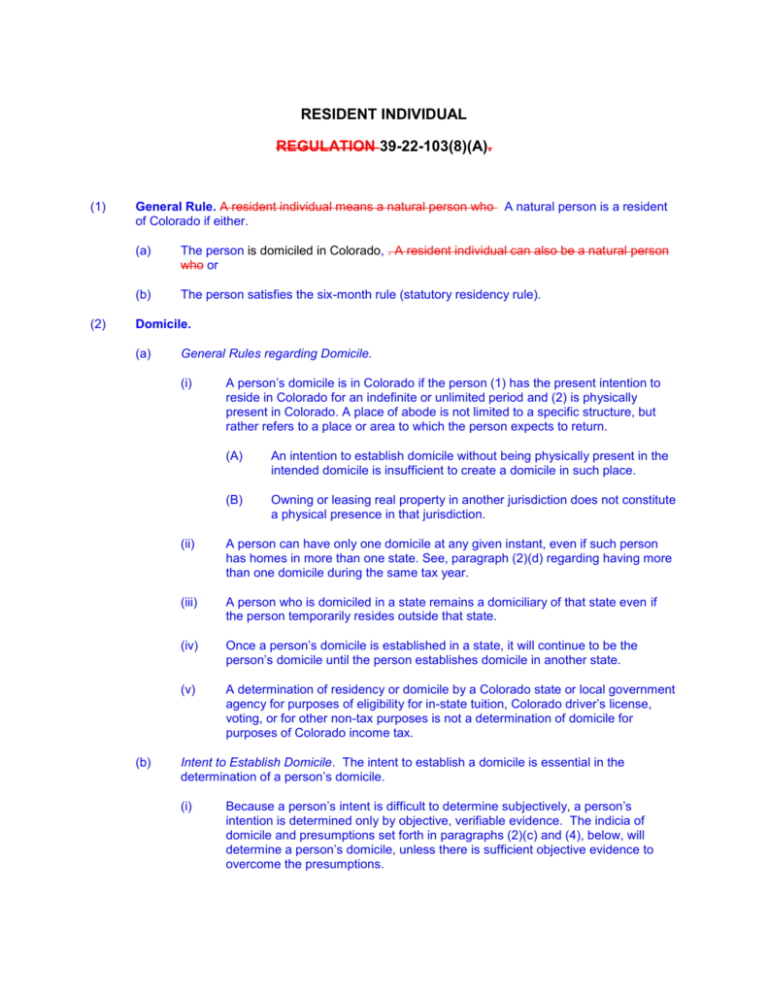
RESIDENT INDIVIDUAL REGULATION 39-22-103(8)(A). (1) (2) General Rule. A resident individual means a natural person who A natural person is a resident of Colorado if either. (a) The person is domiciled in Colorado, . A resident individual can also be a natural person who or (b) The person satisfies the six-month rule (statutory residency rule). Domicile. (a) General Rules regarding Domicile. (i) (b) A person’s domicile is in Colorado if the person (1) has the present intention to reside in Colorado for an indefinite or unlimited period and (2) is physically present in Colorado. A place of abode is not limited to a specific structure, but rather refers to a place or area to which the person expects to return. (A) An intention to establish domicile without being physically present in the intended domicile is insufficient to create a domicile in such place. (B) Owning or leasing real property in another jurisdiction does not constitute a physical presence in that jurisdiction. (ii) A person can have only one domicile at any given instant, even if such person has homes in more than one state. See, paragraph (2)(d) regarding having more than one domicile during the same tax year. (iii) A person who is domiciled in a state remains a domiciliary of that state even if the person temporarily resides outside that state. (iv) Once a person’s domicile is established in a state, it will continue to be the person’s domicile until the person establishes domicile in another state. (v) A determination of residency or domicile by a Colorado state or local government agency for purposes of eligibility for in-state tuition, Colorado driver’s license, voting, or for other non-tax purposes is not a determination of domicile for purposes of Colorado income tax. Intent to Establish Domicile. The intent to establish a domicile is essential in the determination of a person’s domicile. (i) Because a person’s intent is difficult to determine subjectively, a person’s intention is determined only by objective, verifiable evidence. The indicia of domicile and presumptions set forth in paragraphs (2)(c) and (4), below, will determine a person’s domicile, unless there is sufficient objective evidence to overcome the presumptions. (ii) (c) A person’s reason for changing domicile, including to take advantage of tax benefits of a place of abode, is irrelevant so long as the person has an absolute and fixed intention to abandon one domicile and acquire another. For example, a person can lawfully establish domicile in Nevada solely for the purpose of living in a state with no income tax, but whether that person truthfully has a present intention to establish domicile in Nevada and abandon their domicile in Colorado is a matter of proof. Indicia of Domicile. The Department will consider a number of factors to determine a person’s domicile. These factors include, but are not limited to: (i) Place of domicile in prior years; (ii) Length of time in a purported domicile. Although domicile can be established on the first day that a person is physically present in a state, the greater the length of time a person is present in a place tends to indicate that that place is the person’s domicile; (iii) Location of, and length of time residing in, a place of abode by a spouse or dependent children; (iv) Jurisdiction that issued person’s current driver’s license; (v) Jurisdiction where motor vehicle is registered; (vi) Jurisdiction where person is registered to vote; (vii) Employment status, including whether employment or employment duties in the state are permanent or temporary, the location where the person performs most of their employment duties, and location of business assets owned by the person; (viii) Receipt of government benefits, such as unemployment benefits, welfare, and other government benefits; (ix) Location of newly acquired living accommodations; (x) Ownership of living accommodations that are for sale, rented or available for rent to third parties; (xi) Jurisdiction that issued a professional license; (xii) Jurisdiction where person filed a resident or nonresident individual state income tax return; (xiii) Statements of residency in documents, such as applications for insurance, federal income tax forms, particularly if such statements are contrary to the person’s interests; (xiv) Primary mailing address for financial documents and other important correspondence; (xv) Business and social ties to the community, including child’s school, location of family, business memberships, religious institution membership and social memberships; (xvi) Location of primary care physician and dentist; (xvii) Location of real property and the attributes of such property, such as size, value, and purposes for which it is used; (xviii) Location of personal property and its attributes, such as monetary and sentimental value and whether it was located in prior place of domicile. No one factor is determinative and not all factors may be relevant or equally weighted. For example, a person may register a vehicle where their vacation home is located and where the vehicle is primarily used, but that registration does not, by itself, create domicile. The amount of time spent in one place also does not always explain the difference between temporary home and domicile. A person may live in a temporary home or residence for months or years on a temporary work assignment or to attend school and maintain domicile in another state. The person’s intent is the primary factor used to determine domicile. (d) (3) Periodic and Seasonal Changes in Domicile. (i) In limited cases, a person may periodically or seasonally abandon their domicile in one state and establish domicile in another. For example, a person who has a house in Colorado and Arizona and who seasonally moves from one home to another, may be a domiciliary of Colorado and Arizona for different parts of a tax year if the person treats both homes as their primary place of abode for the season. (ii) A person who lives in a motorized home and does not own or lease residential real property that they treat as their home in another state will be treated as a (full-year) domiciliary of Colorado if they have permanent ties to the state and spend, in the aggregate, more time in this state than in any other. However, a person who owns a home in another state but travels seasonally or periodically to Colorado will not, in the absence of other factors, be treated as a domiciliary of Colorado. (e) Status as a student. A student who moves to another state to attend college but who does not intend to remain in that state after graduation has not changed domicile. Moreover, a student who is being supported by a parent or parents does not establish a domicile separate from the parent(s) simply by attending school in another state regardless of whether the student takes such steps as acquiring a driver's license or registering to vote in the state in which he or she attends school. (f) Resident Aliens. A person who is not a citizen of the United States but is a permanent resident alien may establish a domicile in Colorado. A person on a temporary visa is not a domiciliary. However, he or she may be a resident under the six-month rule. Six-Month Rule or Statutory Resident Rule. (a) A person satisfies the six-month rule if: (i) The person maintains a fixed dwelling within permanent place of abode in Colorado, and (ii) who sSpends, in the aggregate, more than six months of the taxable year within Colorado. If a person is domiciled in Colorado, that person remains a Colorado resident even though he or she temporarily resides outside of Colorado. Once a domicile is established, it will continue to determine a taxpayer’s residency until it has been abandoned as a domicile. (b) (c) (d) (4) This six month rule does not apply to: (i) A member of the military who is stationed in Colorado pursuant to an order of the armed forces (see, Servicemembers Civil Relief Act of 2003 (50 USC App. § 501-597b)); (ii) A Colorado domiciliary who abandons their Colorado domicile during the tax year and does not maintain a permanent place of abode after abandoning their domicile; (iii) A person who is domiciled outside Colorado and establishes their domicile in Colorado during the tax year, unless that person has a place of abode in Colorado while maintaining a domicile outside Colorado. A “permanent place of abode” means any place in which a person has a possessory right to live; (iv) A student whose domicile is not Colorado and attends college in Colorado but does not have a permanent place of abode in Colorado. A “permanent place of abode” means any place in which a person has a possessory right to live. (i) The person need not own the abode. For example, a lease of an apartment can constitute a permanent abode. (ii) A recreational vehicle with sleeping and cooking accommodations can constitute an abode. (iii) A person need not be liable for the lease or mortgage obligation for the abode. For example, a person, whose domicile is in another state and whose employer leases an apartment in Colorado for the person to reside while on a temporary assignment in Colorado, has a permanent place of abode in Colorado. The six month rule applies even if the person is a domiciliary of another state. For example, a person who is not domiciled in Colorado is a resident of Colorado for Colorado income tax purposes if the person maintains a permanent place of abode in Colorado and lives during the tax year, in aggregate, more than six months in Colorado. Burden of Proof and Presumptions. The burden of proof and persuasion (collectively referred to in this rule as the burden of proof) is on the person asserting a change of domicile or rebutting a presumption. Whether the burden of proof has been met will be determined based only on objective evidence and cannot be established by subjective evidence (e.g., self-serving statements of intent) unless such statement are against one’s interest. (a) The place where one currently lives is presumed to be the person’s domicile. (b) Once a domicile is established, it is presumed to continue in such place. (c) Spouses are presumed to have the same domicile or permanent place of abode. This presumption does not apply after spouses are separated, even though no judgment or decree of separation or divorce has been rendered. (d) A person in the armed forces does not, as a matter of law, abandon his or her domicile solely by reason of being absent from their state of domicile pursuant to orders of the armed services. However, such a person is not precluded from changing their domicile. (e) A minor child and a dependent are presumed to have the same domicile or permanent place of abode as the custodial parent or custodial guardian. A minor child cannot, by their acts or intentions, change domicile. (f) A person who is domiciled in Colorado and who leaves this state to accept a job assignment in a foreign nation is presumed not to have abandoned their Colorado domicile. (g) The six-month rule does not create a presumption that a Colorado domiciliary not physically present in Colorado for more than six months has abandoned their Colorado domicile. (h) The domicile of a person in military service will generally be determined by the facts existing immediately prior to becoming a member of the armed services. (i) Presumptions regarding permanent place of abode. The Department will presume that a place of abode is not permanent in the following circumstances: (i) A place of abode owned by an individual who leases it to others, not related to the owner or their spouse by blood or marriage where the individual has no right to occupy any portion of the premises and does not use such premises as their mailing address during the term of the lease. (ii) A recreational vehicle camp lot or camp ground without a hookup is presumed not to be a permanent place of abode. (iii) A motel room or any construction which does not contain facilities ordinarily found in a place of abode, such as facilities for cooking, bathing, etc., generally is not be deemed a permanent place of abode. (iv) The apartment, house, or condominium of an individual on a temporary work assignment in another state that returns to their state of domicile when they are not working. (v) An apartment, house, or condominium, paid for by an employer in a location that is not the person’s domicile. For example, an individual domiciled in another state may reside in an apartment in Colorado while on temporary assignment for the employer, after which the person will return to their domicile. If the employer pays for an apartment in Colorado while the employee is on a temporary work assignment in Colorado, the apartment does not constitute a permanent place of abode. However, if the employee pays for an apartment while on a temporary work assignment in Colorado, the employee’s apartment is a permanent place of abode. Cross References 1. See IRS Publication 555 “Community Property” regarding the definition of domicile. 2. See Department Rule 39-22-108(3)(b) for special rules relating to persons in the military and their spouses. 3. People v. White 242 P.3d 1121 (2010), (“The current principal-or-primary-home test for voting purposes, largely adopted by the legislature in 1979 and now expressly made applicable to motor vehicle and income tax matters as well, however, clearly resolves this ambiguity [pertaining to the meaning and proof of “residence”] in favor of an objectively determined “legal residence” or domicile.”) 4. §1-2-102(1)(a)(I), C.R.S. 5. Texas v. Florida, 307 U.S. 398 (1939) 6. Theobald v. Byrns, 579 P.2d 609 (1978).

